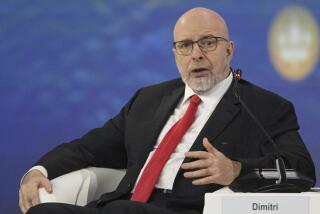Russian Media Mogul Arrested in Spain; Moscow Seeks Extradition
MOSCOW — Spanish police seized fugitive Russian media mogul Vladimir A. Gusinsky on Tuesday at his villa in the southern province of Cadiz, but Gusinsky’s lawyers immediately argued that he is a victim of Kremlin political machinations and should not be extradited to Moscow.
Gusinsky--who has controlled Russia’s only independent television station, NTV--fled Russia after being briefly jailed in June. He is accused by the Russian state prosecutor of financial offenses, specifically misrepresenting the worth of his Media-Most television and newspaper empire when he took out a loan worth $300 million guaranteed by the country’s natural gas monopoly, Gazprom.
Gusinsky’s defenders argue that the Gazprom loan dispute is a pretext and that the two companies have already resolved the issue.
“The case has been clearly trumped up--there is nothing there,” said attorney Genry Reznik, interviewed in Moscow.
Gusinsky’s supporters allege that the prosecution’s real goal is to roll back press freedom and allow the state to take control of NTV, whose news, commentary and satirical programs have allegedly rankled President Vladimir V. Putin and some of his close associates.
However, Russian authorities denied Tuesday that the case is anything but a criminal matter and said they expect Spain to comply with their extradition request soon.
Russian Prosecutor General Vladimir Ustinov, arriving in Sicily for a conference on combating transnational organized crime, said his office would send the Spaniards a package of documents in support of the charges.
Gusinsky, 48, was arrested in front of his family shortly after midnight Monday at the villa he owns in the town of San Roque, a National Police official in Spain said.
“There was not any resistance at all. Quite the opposite. He is an extremely polite person,” said the spokesman, Jose Maria Seara Ruiz. He said police had acted on a fraud warrant from Russia issued through Interpol and that Gusinsky was initially taken to a police station in La Linea de la Concepcion.
Later Tuesday, he was transferred to Madrid to appear before the National Court, which under Spanish law has up to 40 days to rule on the extradition request. If the request is granted, the extradition will still require the Spanish government’s approval.
The case was assigned to a high-profile judge, Baltasar Garzon, the same jurist who sought to bring to justice former Chilean dictator Augusto Pinochet for alleged political violence against Spanish citizens. Spanish Prosecutor Enrique Molina asked Garzon to order the immediate detention of Gusinsky, and Russia’s Itar-Tass news agency reported Tuesday night that Gusinsky had been ordered detained temporarily.
In Moscow, there was a sense of surprise among Gusinsky supporters that judicial authorities in a Western capital had acted on the Russian warrant after so many months during which the Russian oligarch had been living abroad openly.
Gusinsky, who has Russian and Israeli passports, maintains homes in Britain and Israel as well as Spain. His second wife and two of his three children reside permanently in the Sotogrande luxury development in San Roque, according to Spanish news reports. Police said Gusinsky had returned to Spain only Monday from the nearby British dependency of Gibraltar.
Dmitri Ostalsky, the press secretary of Media-Most, called the case against his boss “purely political.”
One of the top on-air personalities of Media-Most, Alexei Venediktov, editor of Echo of Moscow radio, denounced the arrest as a sham in which Spain’s National Police, at least initially, had “acted like a regional division of the Russian prosecutor’s office.”
Venediktov, who said he had spoken to Gusinsky earlier in the day, attributed the arrest to the Kremlin’s frustration at not obtaining editorial control of Media-Most even though state-owned Gazprom in November was awarded a 46% stake in the conglomerate, plus a 19% nonvoting stake, to settle the debt.
“They have not been able to make Media-Most mass media change their tone and political position--all the media remain in opposition to the government and its current policies,” he said.
He also accused the prosecutors of a “personal vendetta” because of Media-Most reports alleging corruption in the prosecutor’s office.
“The only nongovernmental mass medium that has a nationwide reach is the NTV channel, which has been a thorn in the officials’ flesh for quite a while now,” Venediktov said. “And since they do not like to be criticized, they want to solve this problem now, once and for all.”
*
Alexei Kuznetsov of The Times’ Moscow Bureau and special correspondent Cristina Mateo Yanguas in Madrid contributed to this report.
More to Read
Sign up for Essential California
The most important California stories and recommendations in your inbox every morning.
You may occasionally receive promotional content from the Los Angeles Times.










